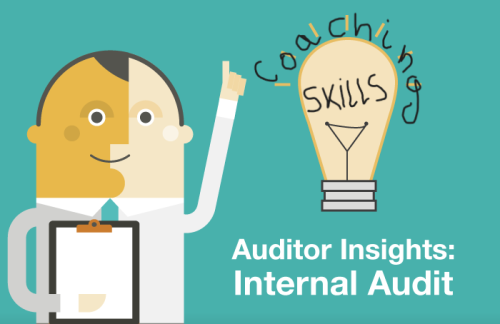Setting vision and goals for 2023!
As we all dive into 2023, for some of us the beginning of the year is an exciting time to set new goals or review the ones we have. My…

What do a coach and an internal auditor have in common?
Here is the article:
On a very high level I could say: they both aim to help the client/stakeholder get the best results, achieve goals, while managing the risks and enhancing effectiveness: doing things the best ways possible; which at times might mean doing things a different way.
What is coaching?
ICF defines coaching as partnering with clients in a thought-provoking and creative process that inspires them to maximize their personal and professional potential. The process of coaching often unlocks previously untapped sources of imagination, productivity and leadership.
What is internal audit?
According to the Definition of Internal Auditing in The IIA’s International Professional Practices Framework (IPPF), internal auditing is an independent, objective assurance and consulting activity designed to add value and improve an organization’s operations.
So what would it look like if internal auditors would engage with their stakeholders in a more provoking and creative thinking processes while looking for the best recommendations to give when issues have been identified?
|
Some of the must have skills of a coach are*: 1. Active listening: uses all the senses when listening 2. Hold the space 3. Non-judgmental 4. Self-awareness 5. Curiosity – ask open questions 6. Positive and supportive 7. Enthusiastic and supportive 8. Critical thinking: problem identification and resolution; patterns identification 9. Wisdom 10. Empathy & emotional intelligence 11. Confidentiality 12. Facilitation 13. Change catalyst 14. Assertive: acts with confidence and persistency 15. Independency or objectivity *this list of coaching skills is not exhaustive. |
Internal Auditors will recognise that some of the skills listed above are part of what an internal auditor is expected to master: confidentiality, independency and objectivity; however I believe many others are not very obviously on the radar for Internal Audit (IA). I believe that many of the skills above are hugely important for internal auditors, as they would enable auditors build better and more purposeful stakeholders relationships.
We tend to focus a lot in IA on what we call “hard knowledge and skills” related to the audited areas, e.g. finance processes and controls; IT governance, project management, risk management, etc.; this is essential and important knowledge that I consider internal auditors already have or will develop if they are in an internal audit role. What I observed over the years is that in IA we do not tend to focus enough on what we call “soft skills”, like some of the ones listed above.
Those skills in my view are the ones which differentiate an IA team from just doing their job; to becoming real business advisor and be a change catalyst; ensuring the business achieves its goals and strategy while managing the risks and seizing opportunities. There is an increase pressure on internal auditors to bring more insightful information and add value to their organisations, and using some of the coaching skills could help IA elevate their impact within the organisation.
Watch the space for more tips on how internal auditors can develop and/or enhance coaching skills.
As we all dive into 2023, for some of us the beginning of the year is an exciting time to set new goals or review the ones we have. My…
Celebrating the first year of showing up in my business! 2022 was my first year of business for ERNL. Officially my company exists for soon 2 years, and the first…
Right in time for the upcoming festive season, my latest article in HOWDO magazine article is a reminder of the importance of celebrating small successes! Online at: https://lnkd.in/eWqMU4vq page 30! Here…